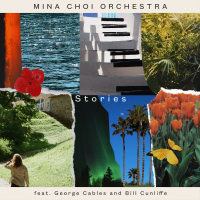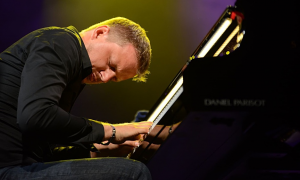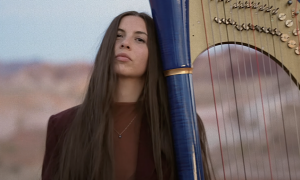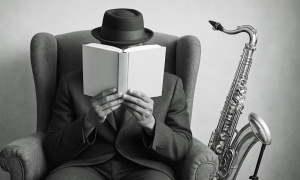Home » Jazz Articles » Interview » Randy Weston: African Stories, African Rhythms
Randy Weston: African Stories, African Rhythms
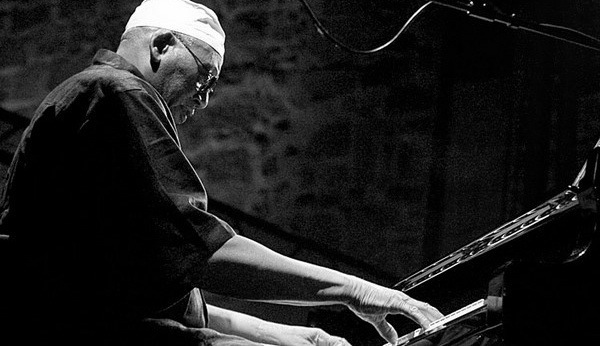
His love affair with Africa has long flavored his music, and his collaborations with the Gnawa musicians of Morocco are particularly celebrated. Over the years, Weston has been invited to play in some of the holiest of sites, from thousand-year-old Japanese shrines to England's most celebrated cathedral—recognition of the spirituality that emanates from his music. He has played with Charlie Parker and Dizzy Gillespie, Art Blakey, Max Roach and Roy Haynes. His music was banned in South Africa during the apartheid years. He has rubbed shoulders with Fela Kuti and Muhammad Ali, and he ran a jazz club in Morocco where he spent six years in the late '60s and early '70s.
At the age of 84, Randy Weston could be forgiven for resting on his laurels, but that wouldn't be his style. In fact, 2010 is proving to be one of the most significant years in his long and distinguished career. In June, his trombonist Benny Powell passed away, marking the end of an association that had lasted 27 years. In August, the Apollo Theater paid tribute to Weston's contribution to music. The same month, Weston led a special concert in Marciac in celebration of James Reese Europe, an African-American soldier who was the first person to bring jazz to France over 90 years ago. November, 2010 will see three noteworthy events: first, a big-band concert at the Tribeca Performing Arts Center, New York to celebrate the 50th anniversary of Weston's acclaimed album Uhuru Afrika (Roulette, 1960); second, the release of his autobiography, African Rhythms (Duke University Press, 2010), and third, the release of a new CD, The Storyteller (Motema Music, 2010).
All About Jazz Randy, African Rhythms is a fascinating read so congratulations to you and Willard Jenkins, who helped put it all together.
Randy Weston: Thank you very much. It's been an incredible life in this world of music—the places music takes you and the people that you meet. I've been truly blessed.
AAJ: All About Jazz would like to pass on its condolences for trombonist Benny Powell, who passed away in June. What are your abiding memories of Benny?
RW: Oh, I called Benny "Ultraman." Benny Powell was not only a great trombonist. He had an illness and he was on dialysis, and many times when we toured he had to go to hospital to have his blood cleaned and he'd come back to play with us. He'd be so tired and his legs would be so weak. I'd say, "Benny, go get some rest," but he'd just get up on the bandstand and play so beautiful. He never, ever complained.
AAJ: Benny was with you for a long time, wasn't he?
RW: About 27 years.
AAJ: In fact, your African Rhythms Quartet with, saxophonist T.K. Blue, bassist Alex Blake and drummer Neil Clarke has been together for a very long time. To what do you attribute the longevity of your musical relationship?
RW: Well, because we love our ancestors and we're all interested in the origins of our music, in our elders and how this music happened. We give each other books on African culture and civilization. We have a great respect and a great love for the artists and our people before us and I think that's what's kept us together.
AAJ: In the book you talk about the black role models who inspired you growing up—people like Paul Robeson, Adam Clayton Powell, Marcus Garvey, Malcolm X and Hazel Scott. Who for you are the black role models for young people today?
RW: Oh, it's the same, you have to go back [laughs]. I just did a wonderful concert on August first in Marciac, France. I did the music of James Reese Europe, a soldier in World War I and the first man to bring jazz to France.
AAJ: And the first black American to play Carnegie Hall, in 1912, with 125 musicians and ten pianos no less.
RW: Yeah, you know we've got to go all the way back to ancient Egypt, ancient Nile valley civilization; we can't compare with today.
How this music happens is something that amazes me—Louis Armstrong and Coleman Hawkins—these people are our royalty. I'm still doing research and trying to figure out what they had to go through with the racism. With severe problems, they managed to produce this beautiful music. Fashion, too—people like Duke Ellington and Billy Eckstine used to dress so well and they set an incredible pattern of pride and dignity. We don't have that today.
AAJ: Another role model you mention in the book is Sugar Ray Robinson, and he said, "Every move you make starts with your heart. That's in rhythm, or you're in trouble." That seems very appropriate for musicians too.
RW: Yeah, at that time all those guys listened to jazz music. Sport and music is the same—it's all rhythm and improvisation. For example, Muhammad Ali had [percussionist] Big Black train him when he fought George Foreman in Zaire. He trained to Big Black's drums.
AAJ: It seems, in the telling of your story, that your musical upbringing and the development of your African consciousness were one and the same.
RW: I had very strong training at home. I had a wonderful mother and father; they were my school. They brought all kinds of music in the house. They would take us to see Duke Ellington or Andy Kirk or Mary Lou Williams. We had the black church, calypso, all kinds of music. They let us know it was all our music.
My dad always talked about Africa. He said you've got to go back to study Africa before slavery, before colonialism, and you'll find out that Africa civilized Europe. But they'd tell us in school that Europe civilized Africa, which was quite a contradiction. Thank God my parents gave us truth, they gave us dignity, they gave us pride and they gave us spirituality, which is so important.
In spite of everything, we were very dignified and we loved all people; we got that from home. But in our neighborhood it was like that.
AAJ: You say in your book that your parents' generation just loved music—all music—and you go on to say, "unlike today's generation." Why do you think there's less love of or appreciation for music among people today?
RW: Because the media is not showing anything. Everything is music for the young. For us, music covered all the ages with no separation; it was either good music or bad music. Everything is focused now on singers, and musicians are in the background. You don't have the wealth of compositions like we had—everything from Jerome Kern to Duke Ellington to Cole Porter. We don't have great composers like those today. But let's face it, so many notes of music have been played since the beginning of this planet, what can you really do that's new?
For me, our period of royalty was the '20s, the '30s, the'40s, the '50s and '60s—the music that was produced in that time was just mind-blowing.
AAJ: Apart from your first album, Cole Porter in a Modern Mood (Riverside Records, 1954), which was an album entirely of Porter's songs, you've always written and recorded your own material. Did somebody advise you early on to write your own material? How did this develop?
RW: It was a combination of a lot of things: my father making me take piano lessons, number one; growing up in a neighborhood where music was our survival as a people because we grew up in a period when were told your color is not good, you have no history—you know, real brainwashing in every possible way, from Hollywood to even the school system.
But the great music, Louis Jordan, Duke Ellington, Count Basie—this lifted our spirit and made us smile at a time when we should not have been smiling. Music was our very first language as an African people, and even during times of slavery when we couldn't speak to each other because they would beat us, we created music as our language. It's an incredible story and it really taught me about the power of music and how important it is.
AAJ: You say in your book that your father told you early on that you were protected in life, and how you always felt protected in life. It does seem that during the year you spent on Okinawa during WWII, you had no fear of the Japanese snipers. Did you never fear that you might not have left Okinawa alive?
RW: Well, that's funny because I think I must have been crazy. You know, when you're 18 or 19 years old [laughs]. I was lucky to have my brother-in-law there. He was a Seabee [engineer], and he told me what to do. That's what I mean by protected. When I look at my life and I think of the things that have happened to me, friends of mine who've been sick and who have died, I've been truly blessed. My father was right. He knew something, like fathers and mother always do [laughs].
AAJ: You talk about the influence of heroin, growing up in Brooklyn. The use of heroin among jazz musicians is part of the mythology, the romance even, of people like Charlie Parker, Miles Davis, Sonny Rollins and Sonny Rollins. How damaging was heroin in the wider community in which you lived at that time, post World War II?
RW: It was very damaging because we lived in a time when if a black person died, it wouldn't even be in the newspaper because a black person was not important. That's the kind of world we grew up in. Between heroin and alcohol, it destroyed the black community. After the Second World War, a lot of African Americans came back from the war hoping to have a better life, but still faced the same racism as before.
People always gave the drug to the artists, and that hasn't changed up until today. And they have an impact on the people. That's what happened, and I saw it happen with my own eyes, and that's why I was glad to be able to escape that and go to the Berkshires. When I look at my life, I think that was already arranged—how could I escape this and go to the Berkshires and do any kind of work and get away from the heroin and the alcohol? It was just amazing.
AAJ: In the Berkshires, you met and worked with Marshall Stearns, whose book The Story of Jazz (Oxford University Press, 1970), set an early benchmark in jazz historiography. How influential was he, both in terms of your development as a musician and as an African American activist?
RW: He was very, very influential. I met Marshall Stearns in the early '50s—this is way before the Civil Rights movement. You know, during that time black people and white people couldn't be together, even in New York. We had separate dances; we didn't have contact with each other. Marshall had a global concept of African culture; he knew we were global people. Thanks to Marshall Stearns at the Music Inn, I met Mahalia Jackson, I met Langston Hughes, Babatunde Olatunji, Candido [Camero]. I met so many incredible people who came up there and gave talks and lectures. Imagine hearing Mahalia Jackson doing a talk on African spirituality in the black church, at three o'clock in the afternoon?
Marshall Stearns was the one who arranged for me to do the history of jazz, and he exposed me to the early styles of piano like Jimmy Yancey, Meade Lux Lewis, Albert Ammons, Eubie Blake, James P. Johnson, Fats Waller; so Marshall gave me so much because he taught me a lot about African culture from a global point of view.
AAJ: Stearns also emphasized the African roots of jazz, didn't he?
RW: People don't realize how young Europe is; African people were making music when Europe didn't even exist. Civilization began in Africa, so the first Europeans were Africans; the first Asians were Africans, because African people migrated. So, Africa brought music to Europe. It's so important that the world considers what Africa has contributed to world civilization. The continent has given so much.
AAJ: Art Blakey, who played on your first trio recording, The Randy Weston Trio (Riverside Records, 1955), is widely quoted as saying: "No America, no jazz. I've seen people try to connect it to other countries, for instance Africa, but it doesn't have a thing to do with Africa." What did he mean? He was one of the most African of jazz drummers, wasn't he?
RW: [laughs] You have to know Art Blakey. He told a lot of tales [laughs]. He was the most African drummer I know [laughs]. Art told all kind of stories. Art was doing African percussion in the '40s.
AAJ:And he went to Africa in the '40s, didn't he?
RW: Exactly. You have to know Art Blakey [laughs].
AAJ: So, he was just messing with our heads. Another musician whom you were tight with is Thelonious Monk, and that's already well documented. You were one of the first pianists to be influenced by him, but what was so difficult about his music for musicians to understand? In an interview in Downbeat with Nat Hentoff in '56 Monk said, "Some of my pieces have melodies a nitwit can understand."
RW: [laughs] Well, I go back to Coleman Hawkins. "Body and Soul" is my number one recording in history. When I heard "Body and Soul" as a kid, I bought three copies. I wrapped two in cellophane paper and hid them. So, I followed Coleman Hawkins, and through him I discovered Hank Jones and through him I discovered Sir Charles Thompson, then Dizzy [Gillespie], Miles [Davis] and Monk. I heard Monk with Coleman Hawkins. At first I didn't understand what he was doing, but I went back again, and what I can say about Monk is that I heard ancient Africa in his music. When he played, it was like a ballet. He captured the sound of the universe. He would play stride piano and make it sound way out. Monk could take a triad, a simple chord, and make it sound dissonant. I'm sure that element he had in his piano was part of the two years he spent travelling with his mother in gospel music in the tent shows. So, he had the black church in his music; you could hear James P. Johnson, you could hear Duke Ellington, the magic of Mother Africa. When I heard Thelonious, that's what I heard, and that's why I had to meet him.
Before that, [bassist] Ahmed Abdul Malik used to take me down to the North African section of Brooklyn, and introduced me to the oud and the kanoun. Malik could play all those notes in between the notes on the bass, and he also played the oud. I would try and do that on the piano, but I could never do it. But when I heard Monk, I heard that sound. That's why I say when an African touches the piano, when an African touches anything, he puts the African spirituality into it, be it a trumpet, a trombone, a matchbox, a table.
AAJ:Have you read Robin D.G. Kelley's book Thelonious Monk: The Life and Times of an American Original (Free Press, 2009), which came out recently?
RW: Robin Kelley and I are very close. We did a few presentations together where I would play some of Monk and talk about Monk, and he would talk about the book.
AAJ: Do you think Kelley's book has succeeded in demystifying Monk and clearing up some of the misunderstanding and mythology that has always surrounded him?
RW: Yes, very much so. Robin Kelley spent a good ten years researching the book.
AAJ: Amazingly so. You and Willard Jenkins spent about four years putting your own book together. There's a lot to be said for taking your time over a project.
There's a great description in your book about the time when you toured with Bullmoose Jackson in '49 and the battle of the bands with Lowell Fulsom's band which had a very young Ray Charles on piano.
RW: Even in New York, when I first started playing this music, they said if you want to play jazz music, then you've got to be able to play the blues, and you've got to be able to play for a woman. These are the two things that are required. Why the woman? She represents the earth, and in your music you have to have feeling and passion, not just running over the keys and playing a whole lot of notes. You've got to be able to touch her, and I learned that in Brooklyn. So, when I made that tour with Bullmoose Jackson it was incredible because I discovered the blues, the meaning of the blues, how we survived from the blues, how the blues was such an important music.
When I played with Jimmy Rushing, he told me, "Man, the blues is the most important music on the planet."
I said, "Why do you say that, Jimmy?"
He said, "Because in no other music do you have so much direct communication."
When you've played in Africa like I have—and I've played in 18 countries—I'm sure that the blues is probably the world's oldest music.
In those battles of the bands we got really hurt, musically [laughs].
AAJ: Were those battles of the bands intimidating theaters to be in or were they very adrenaline-charged, enjoyable situations to be in?
RW: I'd never heard of Ray Charles, I'd never heard of Lowell Fulsom, but we went there with our band, and when we walked into the club, Lowell Fulsom had all the musicians standing on the tables playing their music, and Ray Charles was to the side on piano. When I heard them, I thought, "Uh-oh, we're in trouble." We ran out of Houston after that [laughs]. But that was the beauty of the music—that kind of challenge all the time.
AAJ: Your first recordings as a leader were produced by Orrin Keepnews. It was interesting to read him saying that he has been "profoundly disappointed in the jazz public and in jazz writers at their reaction to Randy Weston." Have you felt in any way misunderstood or underappreciated by the public or critics over the years?
RW: Not at all. I've very rarely had a bad review for anything I've done. I've been really blessed that way. When I moved to Africa, people hadn't heard of me too much, but in my life I think I've maybe had one or two bad reviews. No, I can't complain at all. I've been really blessed. The thing that upsets me is that Mother Africa doesn't get the credit. She is responsible for this music called jazz, from Bossa Nova to Sun Ra and all these things. That's my mission—to say, "Hey, we are a beautiful people; listen to Louis Jordan, listen to Billie Holiday." I want to tell the story of the genius of our people.
AAJ: Another story you relate in your book is about your efforts to develop an African American Musicians Society to counter discrimination against black musicians. How do you account for its short lifespan? Why didn't it take hold and grow more?
RW: Well, you know, I'm not a politician, I'm not an organizer. I just felt the pain that we were going through, and it was something I had to try to do something about. We were the first ones to put anti-discrimination clauses in Union contracts; it didn't exist until we put our organization together. We respect everybody and we want that same kind of respect, so that's why we formed the organization. At that time, blacks couldn't get into symphony orchestras, we couldn't work in studios. Racism didn't just cover music; it covered every part of American life.
AAJ: Buddy Collette passed away recently, and he was a very strong civil rights activist, working to desegregate the musicians union of Los Angeles. Did you run across Buddy Collette at all?
RW: It's funny you should say that. We just came back from Los Angeles two days ago, where I did a book signing. In Watts, they honored Buddy Collette in a beautiful painting by an artist, with some flowers underneath, in a cultural center. They really honored him, and I was so happy to see that. It's funny you should mention Buddy Collette; we just left him spiritually.
AAJ: Turning to another very important figure in your career, Melba Liston was someone with whom you had a very long and fruitful musical association. For a woman trombonist who played in the bands of Gerald Wilson in the '40s and the big bands of Dizzy Gillespie alongside John Coltrane, as well as playing with Count Basie, Dexter Gordon and Billie Holiday, and arranging your music for years, it seems remarkable that no book has ever been written about her extraordinary life. Does that not strike you as strange?
RW: Well, in a way it's strange, but then again the African-American woman had a more difficult time than we did. In addition to that, Melba Liston was never interested in being glamorous. All she ever wanted to do was write music. She never projected herself. She was a very quiet person. Even when she was writing arrangements for me, she would get her friends to go and buy clothes for her for the concert. She was a great woman and a great arranger but at the same time very laid-back. She was an incredible human being, but she was never interested in the glamour, so maybe that's one reason.
AAJ: She also led an all-female quintet in '58. What was that quintet like? Did you ever see it perform?
RW: Of course, I was even at their rehearsals. It was wonderful, but it was difficult for an all-woman band.
AAJ: One of your most celebrated works which Melba Liston did the arrangements for is Uhuru Afrika (Roulette, 1960), which is 50 years old this year. Are there any plans to celebrate the anniversary?
RW: Oh, in a big way! We're going to do a special concert on November 13th at the Tribeca Performing Arts Center in New York. We've already assembled the orchestra. Only [drummer] Charlie Persip, [trumpeter] Clark Terry, [percussionist] Candido [Camero], guitarist Kenny Burrell [reed player] Yusef Lateef and [bassist] Ron Carter are still alive. Charlie Persip and Candido are going to play. Candido's about 90 now and he's still playing great.
At the same time in 1960, 17 African countries got their independence. So, this is the 50th anniversary of freedom from colonialism for 17 African countries, so we're going to have all of Africa there at the concert to celebrate. It's very important.
AAJ: When that album came out it, was banned in South Africa. In the years since the ending of Apartheid have you had the chance to perform the work in South Africa?
RW: Not in Africa, no. I've done it twice in New York: I did it in Lincoln Center and I also did it in Brooklyn. This will be the third time coming up.
AAJ: Why did you not perform that music more frequently? The first time was in '72, and then you didn't perform it again until the '90s. Was it just logistically too complicated?
RW: It's kind of a big work; we had 28 musicians, [poet] Langston Hughes did the text, we had [opera singer] Martha Flowers and [Broadway performer] Brock Peters. It was a big work, so I never really did it that much.
AAJ: So this must be very exciting for you to perform it once again, no?
RW: Of course. I'm very, very happy. Actually, it started with the Kansas City Museum. They wanted to honor Uhuru Afrika, and they put Melba Liston's robes that she worked in on display, and they put my first African robes on display. They have a whole display on Uhuru Afrika. But they didn't realize that it was the 50 year and I didn't either, so when they contacted me it was an incredible coincidence. But, you know, Melba Liston was originally from Kansas City, so by honoring her they honor Uhuru Afrika, so it all came together. Then we all discovered, hey, that was 50 years ago [laughs].
AAJ: You talk at length in your book about your many trips to Africa. You met a lot of interesting people, one of whom, Ghanan drummer Guy Warren [Kofi Ghanaba], made quite an impression on you. Max Roach waxed lyrical about Guy Warren when he first came to Chicago and then New York in the '50s, saying that he was way ahead of what everybody was doing.
RW: He was a great, great percussionist. His song "Love, the Mystery Of" has been my theme song for many years. We finally played together, oh, maybe eight or nine years ago in New York. I had TK Blue, Billy Harper, Alex Blake and Neil Clarke and Guy Warren—Kofi Ghanaba—and he paid me a great tribute. He said, "Man, you can play African music." He was brilliant. He was so important—way before Babatunde Olatunji from Nigeria, Guy was before that in Chicago, and another percussionist from Ghana called Saka Aguela, who lives in Philadelphia. So I met these two giants, and they were the ones who exposed me to African traditional music.
You see, the drum had been outlawed in America during slavery because it was used to espouse freedom, and it was communication. So these guys were very important in bringing the drum back. That's why the Afro-Caribbeans were so important; they brought the drum back.
AAJ: One of the reasons that you left the States and moved to North Africa in the late '60s was due to your disillusionment with the music scene, and you mention the avant-garde and the incursion of electronics, which you describe as the opposite of what black music was all about. What's your feeling about the black music scene today?
RW: We don't have the media. There's no appreciation for the giants; there's never been a major film on Duke Ellington, never a major film on Louis Armstrong. What they accomplished, we could never accomplish today. The good thing about segregation was this: we had our own black movies, our own black theater, so as kids we'd go to the theater and see Bessie Smith or Dorothy Donnegan, or see Cab Calloway or Jimmy Rushing in the movies. But young people don't have that today, and what's happening now is lightweight compared to what happened before. If Louis Armstrong was alive today, he'd be a superstar. If Art Tatum was alive today, my god, all the piano players would get on their knees. So that's what's missing today; we've been cut off from our heritage.
AAJ: You've played in a number of unique settings during your career—you've played in Japanese shrines, you've played in Canterbury Cathedral and a few years ago you played the new Library of Alexandria...
RW: We opened the new Library of Alexandria with bassist James Brandon Lewis. We played my composition "The Three Pyramids and the Sphinx," from my CD Saga (Verve/Gitanes, 1995).
AAJ: Does one place more than any other you've played hold special memories for you?
RW: They all have special memories for me. They were not the Five Spot, if you know what I mean [laughs]. I've been blessed to be able to have these experiences.
AAJ: Is there still one particular spiritual place you would like to perform at?
RW: I want to see every country in Africa. I want to experience all the traditional music of Africa, if I could. I've been to Africa twice already this year, and I go back again in December. I go to Africa as much as I can. When I go to Africa, I go to school. The people teach me things about traditional music which is...mind-blowing.
AAJ: It's four years since your last recording. Do you have any plans to record again with your African Rhythms band?
RW: We've got a recording out the beginning of November called The Storyteller (Motema Music, 2010). Luckily, we were able to record our performance at Dizzy's Club at Lincoln Center in December. I had the quintet with Lewis Nash. It's Benny Powell's last recording and it's so beautiful.
Selected Discography
Randy Weston and His African Rhythms Sextet, The Storyteller (Motema Music, 2010)
Randy Weston and His African Rhythms Trio, Zep Tepi (Random Chance Records, 2006)
Randy Weston, African Rhythms (Comet Records, 2002)
Randy Weston, Ancient Future (Mutable Records, 2002)
Randy Weston, Solo, Duo & Trio (Fantasy Jazz, 2000)
Randy Weston African Rhythm Quintet & the Gnawa Master Musicians of Morocco, Spirit! The Power of Music (Sunnyside Records, 1999)
Randy Weston, Khepera (Verve, 1998)
Randy Weston,How High the Moon (Biograph Records, 1998)
Randy Weston, Saga (Verve/Gitanes, 1995)
Randy Weston, The Spirit of Our Ancestors (Verve, 1991)
Randy Weston, Caravan: Portraits of Duke Ellington (Verve, 1989)
Randy Weston, Rhythms and Sounds (Cora, 1978)
Randy Weston, African Nite (Universal, 1975)
Randy Weston, Blues to Africa (Freedom, 1974)
Randy Weston, Tanjah (Verve, 1973)
Randy Weston, Niles Littlebig (Comet, 1969)
Randy Weston, Berkshire Blues (Black Lion, 1965)
Randy Weston, Highlife (Colpix, 1963)
Randy Weston, Uhuru Afrika (Roulette, 1960)
Randy Weston, Destry Rides Again (United Artists, 1959)
Randy Weston, Little Niles (United Artists, 1958)
Randy Weston, The Randy Weston Trio (Riverside, 1955)
Randy Weston, Cole Porter in a Modern Mood (Riverside, 1954)
Photo Credits Top / Page 1: Jose Horna Page 2: Maria Echeverria
Page 3: Jonathon Curiel
Page 4: Brian O'Connor
Page 5: C. Andrew Hovan
Page 6: Courtesy of Randy Weston
Tags
PREVIOUS / NEXT
Support All About Jazz
 All About Jazz has been a pillar of jazz since 1995, championing it as an art form and, more importantly, supporting the musicians who make it. Our enduring commitment has made "AAJ" one of the most culturally important websites of its kind, read by hundreds of thousands of fans, musicians and industry figures every month.
All About Jazz has been a pillar of jazz since 1995, championing it as an art form and, more importantly, supporting the musicians who make it. Our enduring commitment has made "AAJ" one of the most culturally important websites of its kind, read by hundreds of thousands of fans, musicians and industry figures every month.












